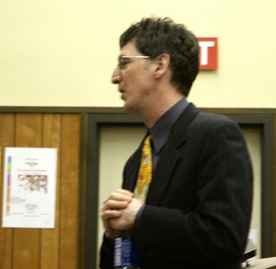 [/media-credit]
[/media-credit]
- Dr. Timothy Killikelly informs Yuba College students about the issue of low voter turnout
Yuba College Students gathered to hear from Dr. Timothy Killikelly, coordinator of Mobilizing Democracy, on Tuesday April 29, at a Crossing Borders, Building Bridges Presentation. The presentation entitled “Why Vote?” addressed the issue of low voter turnout, as Killikelly outlined a program that could help community college students to become registered to vote.
Killikelly identified community college students as a group that largely fits the unregistered voter population. This is because community colleges are composed largely of 18-24 year olds who typically make less money than other demographic groups. Killikelly said, “The California Community College System in the largest education system in the U.S.” He continued, “That’s a large group of people who are in a group of people who don’t vote.”
For this reason Killikelly has been instrumental in an automatic voter registration program that works with the California Community College System and the office of the California Secretary of State. The program, entitled the “California Community College Student Voter Registration Project,” is designed to make the voter registration process simple for students. It allows students to have the voter registration forms automatically processed when they register for their regular classes.
Killikelly said, “When you notice a large group of people not voting, you target those groups and ask them if they would like to vote.”
In colleges where this is already implemented, students are asked at registration if they would like to be sent a voter registration form. Then the information is sent to a centrak server at the California Secretary of State’s office, where the student information is entered into the voter registration form. The completed form is then mailed to the student, who marks if he or she is a U.S. Citizen, marks his or her political affiliation, and signs. The student then mails the form back and is registered to vote.
The program is already in effect at nine California Community Colleges, ranging from as large as Los Angeles College District to the small Taft Community College. Neelam Canto-Lugo, organizer of the Crossing Borders Building Bridges series, hopes that the voter registration program will be implemented at Yuba College. However, Killikelly recommended that the students go to the Yuba College administration and insist that they want it to be started.
Killikelly said that administrators at other colleges have been discouraged from participating in the program due to the fear of cost. However, he urged students to inform the administration that the only cost will be the salary for the supervising faculty member implementing the system. Killikelly said that for other colleges this has taken one faculty member between six and half to 21 hours to implement. He said that this would be a good time for students to go to the college president on the issue as the statewide chancellor recently implemented the program in San Francisco and will be urging college districts to participate.
“Its got to start somewhere with some kind of action,” Killikelly said.
Killikelly feels that implementing this system could have a dramatic effect on the California Community College system and the higher education system as a whole. He believes that politicians realize that community college students do not vote, and thus are not a high priority on their political agendas.
Killikelly said that the attitudes of some politicians are “They (community college students) don’t vote. They can’t do anything back to me when I cut their funding.” He continued, “You are in a system with a huge number of people that can have a huge impact.”
Yuba College Professor, Jim Prager, in attendance at the presentation, commented about the rising California Community College tuition costs at a time reserved for questions and answers at the end. He mentioned that if he were a student at this time, he would not have been able to afford the costs, and commented that an increase in student voters would discourage politicians from making such increases.
An increase in Yuba College voters would also be beneficial to the local community, as the number of eligible voters who turned out for the November 2002 General Elections from Yuba County was the fourth lowest in the state, at 31.21 percent. The United States as a whole ranks last of the 25 long time democracies in voter turnout since 1945 with, on average, only 48.3 percent of those who are eligible voting.
Implementing the student voter registration program could increase voter turnout simply by making students aware that they are eligible and able to vote. For this reason Killikelly would like to see the program started for the upcoming class registration period, so that students would be ready to vote for the November 2004 General Elections.Canto-Lugo said, “The first step is getting informed.” She continued, “I recently saw a bumper sticker that I think describes it. ‘Think globally. Act locally.'”
Comment Policy: Comments are welcomed and encouraged. However, the editorial board reserves the right to edit or delete, without notice, any comments submitted to the blog. For more details, see our full Comment Policy.